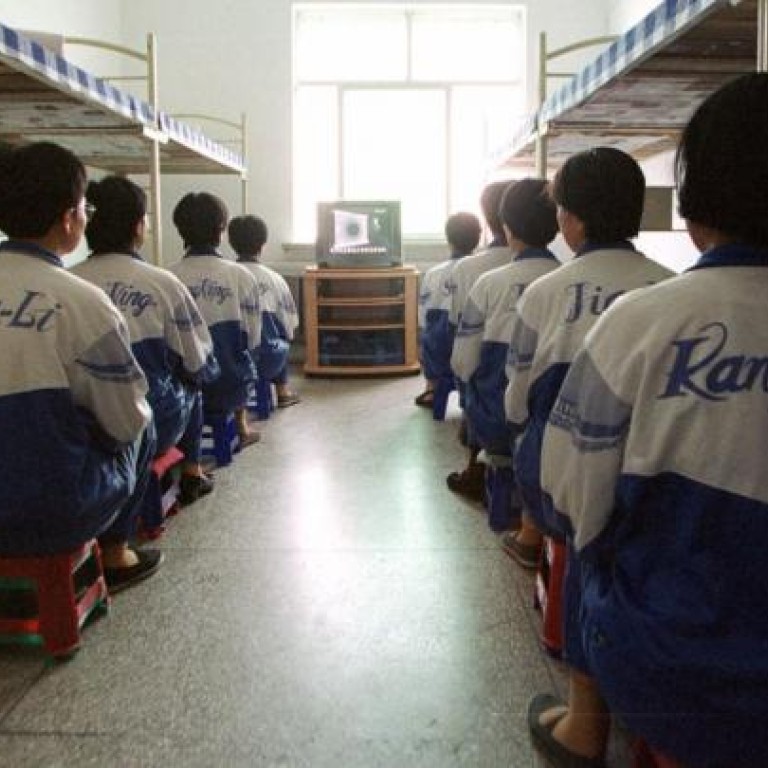
Women 'chained up and tortured' in labour camp
Guards hurt inmates with electric rods, made them work long hours for no pay, report says
A rarely seen report by a Chinese monthly has exposed some of the dark practices of a Liaoning labour camp including torture and inhuman treatment of female prisoners at a time when the government has vowed to reform the country’s notorious, decades-old labour camp system.
The claims, reported by , part of the leading SEEC Media Group, are based on accounts of provincial procurators, former camp officials and former and current prisoners.
Masanjia female labour camp, near Shenyang, houses nearly all the female forced-labour prisoners in Liaoning province and is one of over 300 labour camps in China, where police can imprison people for up to four years without trial, a practice condemned by critics as arbitrary and unconstitutional.
The report revealed that women prisoners had frequently undergone torture for not obeying prison officials, according to the prisoners’ accounts.
Labour camp administration laws stipulate police officials can only employ electric rods during prison breaks or riots or if they are assaulted by prisoners. But the report claimed prison guards had used electric rods regularly to torture prisoners, leading in cases to disfigurement and nerve damage.
“It was extremely painful, causing my body to shake,” one woman recalled. Another woman who had an electric rod pressed on her tongue said, “I could not stand still when the electric current flowed through my tongue. It was like being pricked by needles.”
Use of handcuffs was reportedly widespread with prisoners handcuffed to iron bars or gates for prolonged periods of time, sometimes more than a week. Some prisoners said they were handcuffed with both hands above their heads and unable to touch the ground with their feet.
The reported also revealed the camp had exploited the prisoners as a labour force.
Laws stipulate prisoners work not more than six hours a day with no more than two hours of overtime. But Masanjia inmates claimed prisoners were engaged in garment manufacture for 12 to 14 hours every day starting from 5am and were beaten if they were too slow or their work did not meet required standards.
Prisoners also claimed they were responsible for building roads and farming 2,500 acres of land, growing corn and cotton.
Peng Daiming, the former deputy administrator of the camp, said there were over 5,000 prisoners at one point, generating almost 100 million yuan (HK$125 million) a year, while each prisoner was paid nothing.
According to the
Prisoners were also forced to pay for medical treatment, which was supposed to be free, with the health of many prisoners worsening during their time of incarceration as the facility did not have adequate medical equipment and prisoners were not allowed to receive treatment outside.
Sick and disabled prisoners were still required to work regardless of the severity of their symptoms or the impact of labour on their conditions.
Many claims reported by appeared to echo those of the outlawed Falun Gong. Long labelled a “cult” by the Chinese government, the Falun Gong has long accused the government of imprisoning and torturing hundreds of its practitioners in the same labour camp.
The report, a rare look inside a Chinese labour camp, did not last long in the Chinese cyber sphere. It was taken down by all Chinese news portals except one as of Monday afternoon, only hours after it was put online and widely reposted.
In January, China’s senior legal official Meng Jianzhu hinted the government would reform the “re-education through labour system” this year, although details were not disclosed.
But in another twist of the events, state-owned news portal Nen.com.cn said in a brief on Monday evening that the Liaoning government had paid a high degree of attention to the allegations. It said the government had formed a joint panel consisting of Department of Justice, Provincial bureau of reform-through-labour administration, and local procuratorial organs “to conduct an objective, transparent and just investigation on the relevant contents in the report.”

